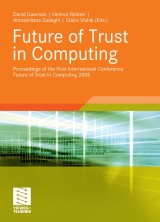Details

Future of Trust in Computing
Proceedings of the First International Conference Future of Trust in Computing 2008|
18,18 € |
|
| Verlag: | Vieweg & Teubner |
| Format: | |
| Veröffentl.: | 26.07.2009 |
| ISBN/EAN: | 9783834893246 |
| Sprache: | englisch |
| Anzahl Seiten: | 227 |
Dieses eBook enthält ein Wasserzeichen.
Beschreibungen
Several constituencies are working on building and preserving users’ trust in the digital economy through - are examining new behaviors associated with ubiquitous connectivity and mobile computing as wel- hance privacy using new technologies and processes in order to ensure that concerns about privacy do where users’ rights are protected and technology is designed in a way to make sure it can be trusted. Consumer advocates are ensuring that users’ requirements and concerns are understood and recognized. trusted systems. And technologists and architects in industry are designing products and technologies are only now starting to be exchanged. - ability, economics and provable security and assurance. Many papers touch upon innovative topics and areas have achieved during the last decade. Ahmad-Reza Sadeghi Claire Vishik Session 1: Security Environment and Threats Study on Information Security and e-Trust in Spanish households Instituto Nacional de Tecnologías de la Comunicación (INTECO) León, Spain observatorio@inteco.es Abstract Security and e-Trust in Spanish households has been conducted by INTECO (The Information Security Observatory. It is a stud- vidual households with Internet connection, spread across the whole country. security incidents in the security security equipment at the perception regarding security on the Internet in Spanish 1 Objectives security, trust and security level incidents in Spanish Internet user Security and e-Trust- and obstacles related to the Security Habits security risks. Security and Vulnerability Incidents: horses, worms, spyware, etc- net user, income, and other sociologically relevant variables.
Security Environment and Threats.- Study on Information Security and e-Trust in Spanish households.- Technical Issues with Trust in Computing and Proposed Solutions.- Implementing a Portable Trusted Environment.- New Directions for Hardware-assisted Trusted Computing Policies (Position Paper).- Smart Cards and remote entrusting.- Designing for the Future: New Approaches.- Future Threats to Future Trust.- Trusted ? Trustworthy ? Proof Position Paper.- An ongoing Game of Tetris: Integrating Trusted Computing in Java, block-by-block.- TrustCube: An Infrastructure that Builds Trust in Client.- Obtaining Trust and Modeling Trust Environments.- Trust-based Information Sharing in Collaborative Communities: Issues and Challenges.- Can Economics Provide Insights into Trust Infrastructure?.- Reviewing Privacy during Design – Voluntary Technology Dialogue System.- Applications: Trust in Health Systems.- Trust and Privacy in Healthcare.- Protecting Patient Records from Unwarranted Access.- Challenges in Data Quality Assurance in Pervasive Health Monitoring Systems.- Future of Trust: New Models for Network, Device and Infrastructure Security.- Towards one PC for systems with different security levels.- Trust Relationships in Networked Context Aware Systems.- Towards Trusted Network Access Control.- Usability.- User-Friendly and Secure TPM-based Hard Disk Key Management.- Requirements and Design Guidelines for a Trusted Hypervisor Interface.- TCG Technology: Issues and Applications.- Offline dictionary attack on TCG TPM weak authorisation data, and solution.- Trusted Virtual Disk Images.- Shall we trust WDDL?.- Trusted Computing Management Server Making Trusted Computing User Friendly.
David Grawrock is a Senior Principal Engineer and Security Architect for the Initiatives, Technology Pathfinding and Planning group at Intel Corp (USA).<br>
Helmut Reimer is Senior Partner at TeleTrusT Deutschland e.V.<br>
Ahmad-Reza Sadeghi is the Head of System Security Group at Horst Goertz Institute for IT Security at Ruhr-University Bochum, Germany.<br>
Claire Vishik is Security & Privacy Standards & Policy Manager at Intel Corp (UK).<br>
Helmut Reimer is Senior Partner at TeleTrusT Deutschland e.V.<br>
Ahmad-Reza Sadeghi is the Head of System Security Group at Horst Goertz Institute for IT Security at Ruhr-University Bochum, Germany.<br>
Claire Vishik is Security & Privacy Standards & Policy Manager at Intel Corp (UK).<br>
The concept of trust is related to many aspects of our daily lives, and different stakeholders use the term “trust” in various contexts. Trust is crucial in today’s information societies for ensuring success of digital economies in all countries and regions. This book contains papers that were presented at the conference “Future of Trust in Computing” and brings together academics, regulators, technologists, and practitioners working in diverse areas of trust from various parts of the world. The authors discuss issues they are facing and begin to form a common framework. Security and privacy threats and remedies, core trust-enforcing technologies, innovative applications, regulatory issues, privacy and usability, economics as well as provable security and assurance are discussed. Finally, a number of papers touch upon innovative approaches to trust that begin to define new fields of research and innovative types of technologies.
Proceedings of the First International Conference Future of Trust in Computing 2008
The concept of trust is related to many aspects of our daily lives, and different stakeholders use the term “trust” in various contexts. Trust is crucial in today’s information societies for ensuring success of digital economies in all countries and regions. This book contains papers that were presented at the conference “Future of Trust in Computing” and brings together academics, regulators, technologists, and practitioners working in diverse areas of trust from various parts of the world. The authors discuss issues they are facing and begin to form a common framework. Security and privacy threats and remedies, core trust-enforcing technologies, innovative applications, regulatory issues, privacy and usability, economics as well as provable security and assurance are discussed. Finally, a number of papers touch upon innovative approaches that begin to define innovative types of technologies.


















